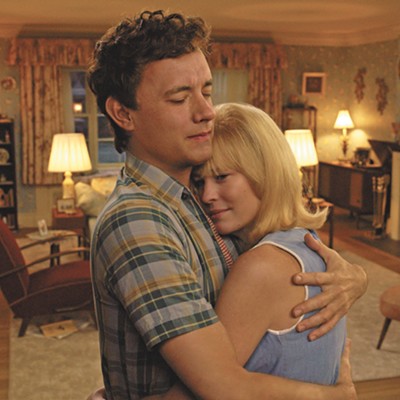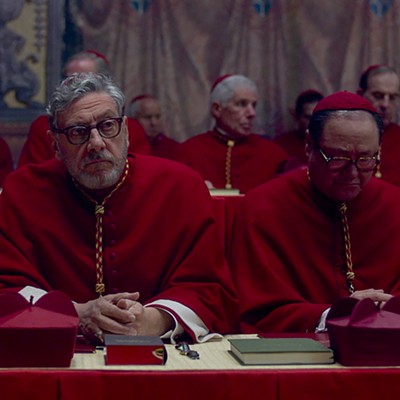From the very opening scene of The Royal Hotel, Julia Garner (Ozark) immediately grabs your attention. She won't let it go for the next 90 minutes of this subtle yet sharply tense thriller that makes the most of her presence. When first introduced to her character Hanna, there is already a steely determination in her eyes as she walks through a dark interior before emerging into the bright light of a bustling boat party. A smile breaks out on her face as she finds her friend Liv, also perfectly played by Jessica Henwick (Glass Onion), and the two settle into a natural rhythm.
But their flow gets disrupted when they realize they're running low on funds. The two have been backpacking around Australia, but now need to find some work to keep the trip going. When an opportunity presents itself to work at a remote pub deep in the Outback, Hanna seems a bit nervous, but Liv cracks a kangaroo joke to try to ease her pal's tension. Off they go to this temporary gig, one that will soon trap them in a terrifying purgatory. If this sounds familiar, the story is actually inspired by the 2017 documentary Hotel Coolgardie. While that is also worth seeing, this film is no mere retread — it becomes something sinister all its own.
Written and directed by Kitty Green, who cut her teeth directing great documentaries of her own before making her narrative debut with the shatteringly minimalist thriller The Assistant (which also starred Garner), this new film is another precise study of the everyday terrors that can take hold. From the moment Hanna and Liv begin working, they face immense disrespect from all angles. Their perpetually drunk boss Billy, played by The Lord of The Ring's Hugo Weaving in one of his best performances, is an increasingly monstrous man made no less awful by how pitiful he is. The bar's patrons are no better, constantly harassing Hanna and Liv at every turn. When confronted, they'll say it is a joke. Of course, they're the only ones maniacally laughing.
What follows is a thriller that cuts deepest when it is at its most understated, as it captures the way misogyny can become so commonplace that it is like an invisible poison gas lingering in the air. It is no less destructive, but a good number of the patrons cycling through bring it in with them. They may seem like cartoonish assholes, but each can become cruel in the blink of an eye. Green presents this frankly and without pretense, with her approach to staging a scene proving to be as unsettling as ever. It is more frenetic than The Assistant, as this is a bar as opposed to an office, but she finds the same gut punches when it all quiets down. The pace of the edit further creates a perpetually uneasy feeling, as if we are surveying the entire scene with Hanna and trying to keep an eye on all the people that are swirling around her. Though Liv is oddly made less central, often feeling underwritten, you still feel a growing sense of dread for both of them that they work through differently. This reaches a breaking point in a petrifying nighttime scene as one side character comes to the forefront, showing a grim conclusion could be waiting in the wings.
Even as the eventual ending is less confident than the rest of the film building up to it, Green's command of the little details ensures it still burrows its way under your skin. It is a sociological excavation that ensures you feel the rot taking hold. It is not quite on the same level as The Assistant, but that is a high bar to clear for just how uncompromising it was. What unites the films is how honest both become. In each, Green takes the places we are familiar with, like an office or a bar, and holds them up to the light to show the ugliness lurking underneath it all. When everyone is revealed to be complicit in this, it isn't enough to just announce its last call. ♦



















